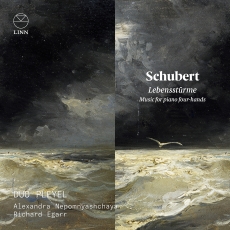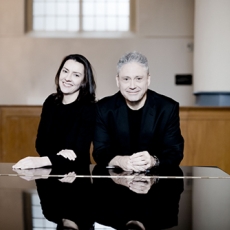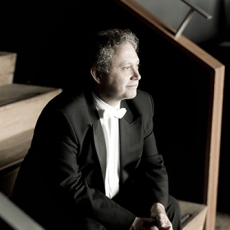Duo Pleyel - Schubert: Lebensstürme; Music for piano four-hands - The Observer
Home listening: in stormy times, Schubert is balm for the soul
“There’s no love song finer/ But how strange the change/ From major to minor”, as Cole Porter observed in his Great American Songbook classic Ev’ry Time We Say Goodbye (1944). Surely he had Franz Schubert (1797-1828) in mind when he wrote those words, though. In Schubert’s case it’s as often the change from minor to major, the light that comes from darkness, the smile out of the frown, that is strange, and affecting. Our own goodbyes, courtesy of Covid-19, include a farewell to normal concert life. There’s no “ev’ry time” here. Online streaming has become the new “live”, and recordings must quench all our other musical needs, unless we can make music ourselves (at a safe social distance).
One CD from the pile on my desk – showing a picture of a single gull flying over a dark, heaving sea – stood out. No surprise to find it was of music by Schubert, its title timely: Lebensstürme: Music for piano four-hands, performed by Duo Pleyel (Alexandra Nepomnyashchaya and Richard Egarr), on the Glasgow-based Linn label.
Lebensstürme translates as “storms of life”. No one quite matched the Viennese composer, dead by 31, in his capacity for compressing brief joy, sorrow, friendship, solace into a short song, or a simple change of key. “Every night when I go to bed, I hope that I may never wake again, and every morning renews my grief,” he wrote. Yet music gave him purpose: “I compose every morning, and when one piece is done I begin another.” We might learn from his equanimity.
Will anyone dare play duets, a perfect domestic activity, in this becalmed existence?
The title “storms of life” wasn’t Schubert’s. This work, the Allegro in A minor, D947, was written in May 1828, the last year of his life. It was eventually published in 1840 by Anton Diabelli, who thought up the name, presumably with an eye to the market. It has the weight and drama of the first movement of a sonata, opening with thunderous, emphatic chords – undeniably stormy – then skittering off with rushing accompaniment, and rapid scales passing between the four hands. Silences interrupt, like jerky, jumped grooves. The middle section, in a bizarrely unrelated key, rescues us from the grey-black opening. Tranquil and hymn-like, this glow of copper and bronze is short-lived.
Duo Pleyel, as the name indicates, use a French Pleyel piano from 1848: bright-toned, almost acidic at the top but warm, with a clean, nimble action. The sense of four hands entwining across the keyboard (will anyone dare play duets, a perfect domestic activity, in this becalmed existence? A real question) is vivid, immediate. The instrument’s sound conjures an intimate Biedermeier drawing room of the sort Schubert might have known.



